
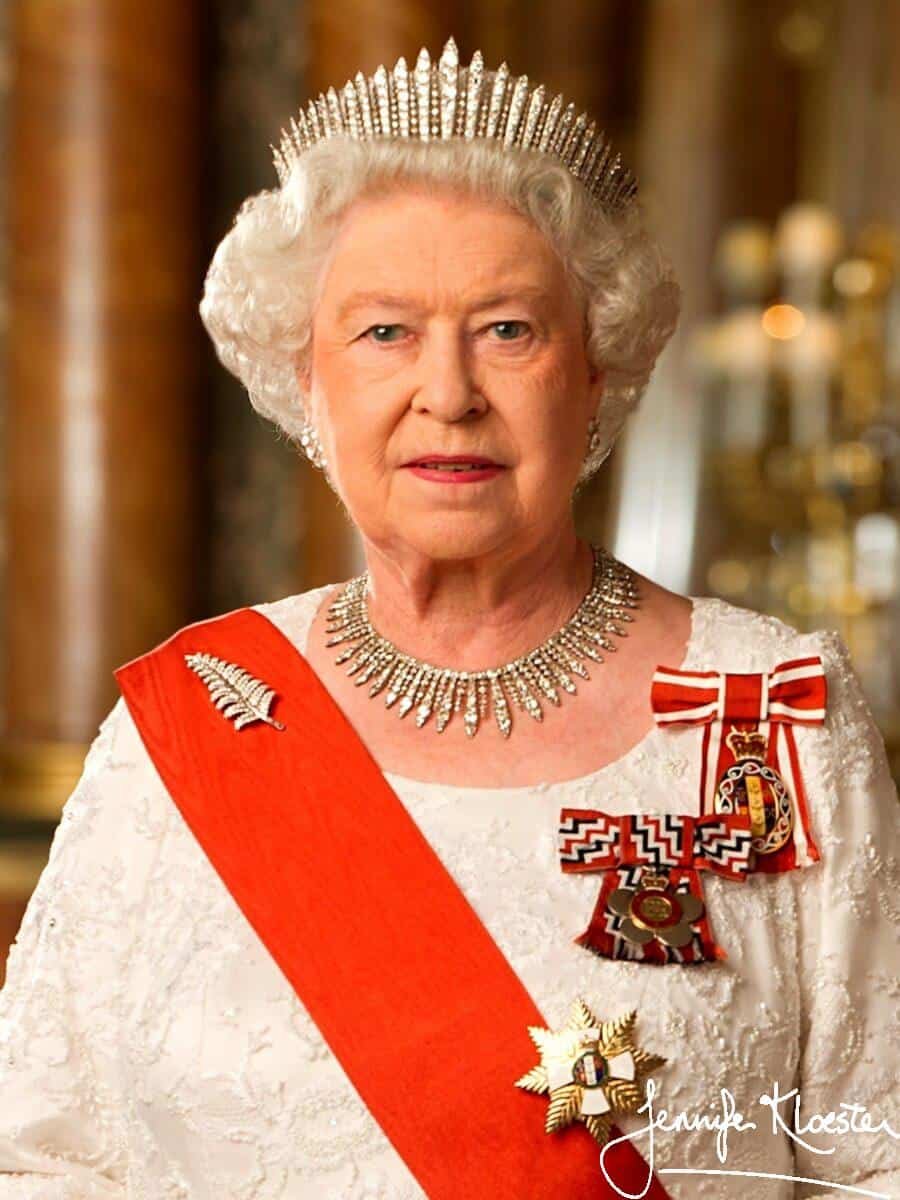
HM Queen Elizabeth II
While this post is about Georgette Heyer’s last complete novel, it seems somehow fitting to pay tribute to HM Queen Elizabeth II who died today (8 September 2022) at the age of 96. Whether you’re a royalist or a republican, Queen Elizabeth’s standing in the world was unmatched. She was a remarkable woman, dedicated to her people, kind, honourable, and unswerving in fulfilling her duty – as she had promised to do upon coming to the throne more than seventy years ago. She was a “Lady of Quality” and someone whom Georgette – like so many others – greatly admired. The two women met in 1966 when the Queen invited Georgette to lunch at Buckingham Palace (you can read about it here https://jenniferkloester.com/georgettes-lunch-with-the-queen/) and Georgette and Ronald also attended a number of Her Majesty’s garden parties. The Queen was a fan of Heyer’s novels, and after their lunch, she visited Harrods where she bought a dozen copies of Frederica and told the department manager that she thought Georgette “formidable”. In her turn, Heyer described the monarch as having “a merry twinkle and quite a lively sense of the ridiculous”.

Restraint
Both the Queen and Georgette believed in restraint and discretion. Theirs was a generation that valued privacy. For them, one’s public life was to be kept separate from one’s personal, private life. Georgette believed in this very strongly and lived her entire adult life according to this precept. The Queen, however, did not have that choice. Although, in the early years of her reign, she was able to maintain a decided separation between her public and private worlds, as the years passed, and technology took hold, people’s private lives became ever more a saleable commodity. Georgette, of course, died in 1974; the Queen has lived on for almost another half century. In those fifty years change – especially technological change – has been the marker of many people’s lives. While Elizabeth II has remained a constant throughout these past seventy years, change has found her too. This was never more clear than in 1997 after the death of Princess Diana when the Queen was strongly criticised for not speaking publicly about the tragedy. But people of her generation did not believe that expressions of grief were for public consumption. They had been taught to control one’s emotions. By the late twentieth century, however, the Queen’s instinctive reaction to Diana’s death – to keep her family close and her two young grandsons shielded from public gaze – was no longer acceptable to a grieving public. As the BBC explained:
Many of her critics failed to understand that she was from a generation that recoiled from the almost hysterical displays of public mourning that typified the aftermath of the princess’s death. She also felt that as a caring grandmother that she needed to comfort Diana’s sons in the privacy of the family circle.”
BBC, 8 September 2022
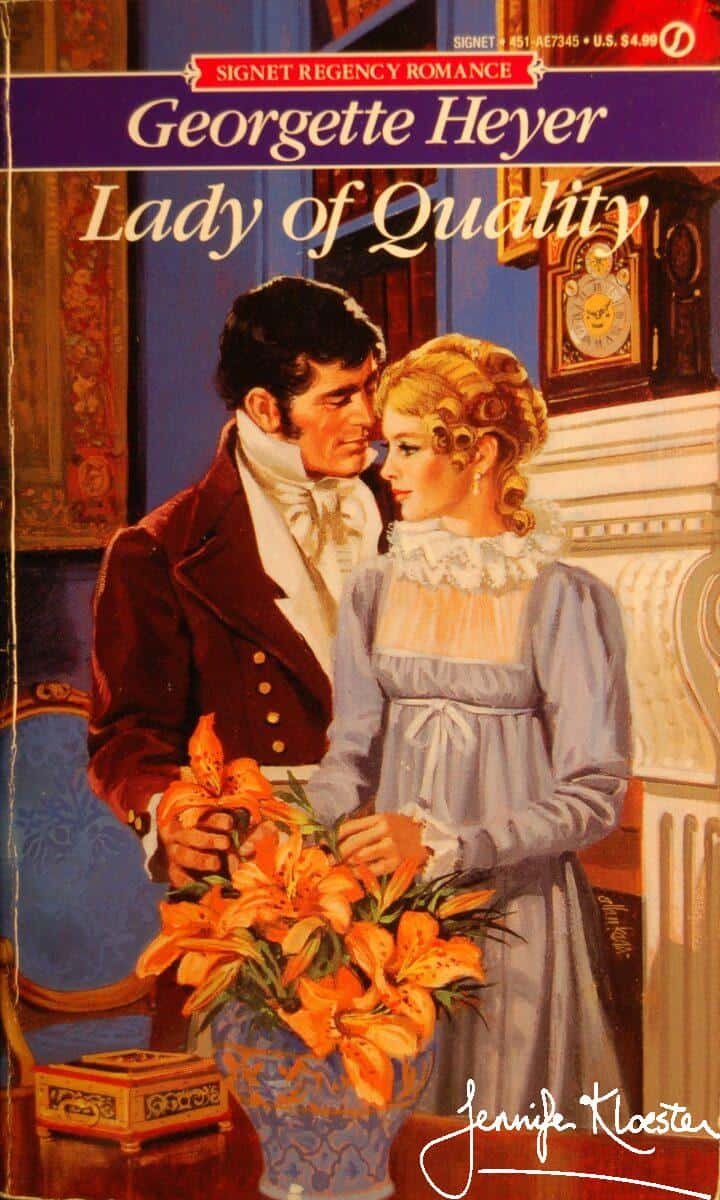
The last novel
One of the hallmarks of Heyer’s novels is emotional restraint. It is a sign of a character’s worth. The lachrymose, hysterical, “tragedy Jills” and “tragedy Jacks” of the books are almost always secondary characters of questionable virtue, often manipulative and usually weak. Lavinia in The Black Moth, Tiffany in The Nonesuch and Mrs Dauntry in Frederica are but three example of people who either cannot control their passions or use public displays of emotion to achieve their ends. Georgette’s last completed novel, Lady of Quality, has two characters who are the polar opposites of each other in this regard. The heroine, Annis Wychwood, despite a good deal of provocation, is a model of emotional restraint. Her companion, however, the garrulous and irritating Maria Farlow is a woman who gives tongue to every thought and actions to every emotion. Maria is not a bad character – Heyer’s characters are complex and rarely painted solely black or white – but her lack of restraint puts her beyond the pale for both Annis and the reader. Lady of Quality is a reflective book. Perhaps Heyer’s most reflective. The heroine has created a pleasant life for herself: living independently in Bath, famed for her beauty and liked by all in her social circle. And yet, she is not content. Her life is small and constrained by the rigid social protocols of the day. Society says she must have a companion, but Maria is no true companion in terms of interests or intellect. Heyer sets the scene perfectly for the arrival of three people who will change everything.

I am longing to know what you think of our new abode – and longing even more to see you both, and to remember that I am not only a Sister, and a Housewife, but a NOVELIST as well! At the moment, I am too tired even to think about a new book, but this has happened to me many times before, and I know that suddenly an Idea will burst upon me – after which I shall forget that I’m a Sister and a Housewife, and shall plunge deep into the early XIXth Century, and be lost to Society until I have written THE END!
Georgette Heyer to Max and Joan Reinhardt, letter, 23 December 1971
“the grace, the marvels and the sheer magic”
1971 was another of Georgette’s rare years without a book. She had been unwell and was easily exhausted. In November, on finding the flat too noisy, they had finally left Jermyn Street and moved to a spacious apartment in Knightsbridge with views across Hyde Park. Christmas had not been easy that year, for her brother Frank’s wife, Joan, had died only ten days before the planned festivities and Boris’s wife, Evelyn was very unwell with kidney problems. Georgette, too, had suffered from poor health and a series of accidents had left her with a gashed ankle and bruised ribs. A month later she broke her leg. Perhaps it was the sudden advent of an unexpected letter that prompted her to start a new novel. In mid-January Georgette received a charming letter from an American reader who wrote to say, among other things:
I am not given to the writing of letters of praise to famous individuals. In this instance, I am literally compelled to do so by a feeling of gratitude so strong that the peace of my nerves demands an assuaging through the process of thanking you for the grace, the marvels and the sheer magic of your writing. Your Regency novels are read and re-read…time after time. As one who is involved in a business of intense pressure (I direct senatorial and congressional election campaigns), I have only to turn to your pages to find a measure of charm, a flow of personal relations that allows one to slip into the period now so removed and, above all, an intense joy of your offerings. Beneath the easy concourse of your characterizations and plot, there is real meaning for me in the proceedings of the a day in which the surface of manners allowed a more graceful and honest meeting of gentlemen than the sheer power of our own.
Mr Roy Pfautch to Georgette Heyer, letter, 31 December 1971
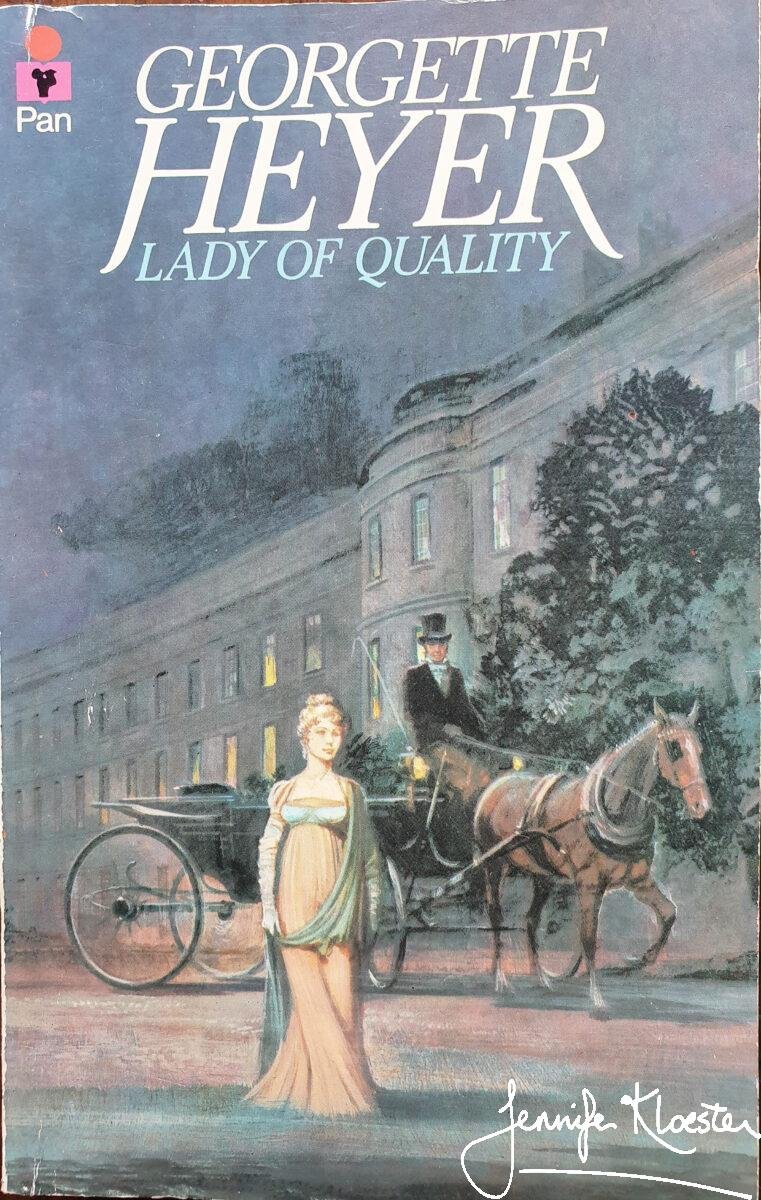
“Wrestling with a new book”
Such sincere and effusive praise from a man of standing meant a lot to Georgette and she wrote a graceful reply to Mr Pfautch in which she assured him that: “I’m not really as good as you think I am, but it is very nice to be told I am!” Perhaps it was this letter that prompted Georgette to begin writing again, for only a week later she told her publisher, Max Reinhardt, that he could expect a new book from her in time for autumn publication. Max was delighted but Georgette would not find it as easy as she had in the past. Early in February she told her old friend, Elizabeth Anderson of Heinemann, that “I am wrestling with a new book, & finding my hand rather stiff, & my brain very woolly.” She persevered, however, and though she felt she was “making very heavy weather” of it, her friend and agent, Joyce Weiner, assured her that “You know it will come of itself, that the plot, action, ‘argument’, what you will, is secondary to the characterisation, and the dialogue will flow once you get going”. Joyce was right. Georgette’s lifelong skill reasserted itself and gradually the book took shape. By April, she had made good progress and could triumphantly tell Reinhardt that:
Ronald says the operative words are “the rudest man in London,” and I shouldn’t wonder at it if he’s right… I’ve left him making himself thoroughly obnoxious to Lord Beckenham, in the Pump Room, and must go back to him, and think of a few more poisonously rude things for him to say… I have only to add that Mr Carleton is not merely the rudest man in London, but has also the reputation of being a Sad Rake, to convince you that he has all the right ingredients of a Heyer-Hero.
Georgette Heyer to Max Reinhardt, letter, 27 April 1972
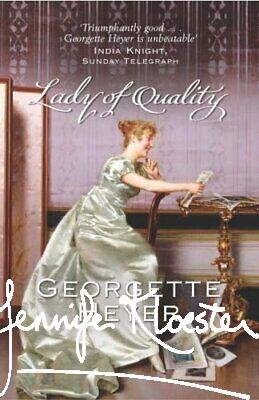

“Annis, Oliver, Lucilla & Ninian–four wealthy people, all dissatisfied with their lives. But in the rigid society of Regency England, could they find ways to change them?”
Title page of the serial, Woman’s Own, 14 October 1972
Annis & Oliver
Oliver Carleton, the hero of Lady of Quality is one of Heyer’s care-for-nobody heroes. He and the book’s heroine, Annis Wychwood, on first meeting, appear to be polar opposites. Instead, they discover that they are each possessed of a sharp intelligence, a quick wit and a shared sense of humour. Annis, brought up in strict propriety, has already shocked her relatives by choosing to use her considerable fortune to set up her own house in Bath – with the requisite companion, of course. Change is thrust upon her, however, when she rescues nineteen year-old Lucilla, and her childhood friend, Ninian, from a carriage accident and takes them home. Soon afterwards, Lucilla’s disreputable uncle arrives to find out who this woman is who has taken charge of his niece. Inevitably, sparks fly and against all expectation, Annis finds herself drawn to this obstreperous and outspoken man. Readers sometimes comment on the obvious similarities between Lady of Quality and Black Sheep and there are certainly several points in common. But the two books also differ in a couple of important and interesting ways.
In this book, more than in any other of Heyer’s, the reader is party to many of Annis’s inner thoughts. Her doubts about Oliver, marriage, and the right future for herself and her household all come to the fore. Oliver Carleton is unlike any man she has ever know. In courting her he has “employed no arts at all” but has still disordered “her well-regulated mind”. Here intellect and rational thought clash with emotion as Annis struggles to work out whether it is worth giving up her independence (a rare commodity for women in the Regency era) to marry a man who – when considered rationally – should not appeal to her at all. A close reading of this, the last of Georgette Heyer’s many wonderful and perceptive novels, tells us a good deal about Georgette’s own thoughts and feelings about love, relationships and what makes a good marriage. There are elements of her own husband, Ronald Rougier, to be found in the characters of both Oliver Carleton and Annis’s brother, Sir Geoffrey, but it is Annis who compels us as she struggles to understand her own feelings. Everything about Oliver Carleton is new and unexpected and in the end she finds herself contemplating the very nature of love:
“It was easy enough to understand why she should so often hate him; nearly impossible to know what it was in him that made her feel that if her were to go out of it her life would become a blank. Trying to solve this mystery, she recalled that he had told her not to ask him why he loved her, because he didn’t know; and she wondered if that was the meaning of love: one might fall in love with a beautiful face, but that was a fleeting emotion: something more was needed to inspire one with an enduring love, some mysterious force which forged a strong link between two kindred spirits. She was conscious of feeling such a link, and could not doubt that Mr Carleton felt it too, but why it should exist between them she was wholly unable to discover.”
Georgette Heyer, Lady of Quality, Pan, 1972, p.183
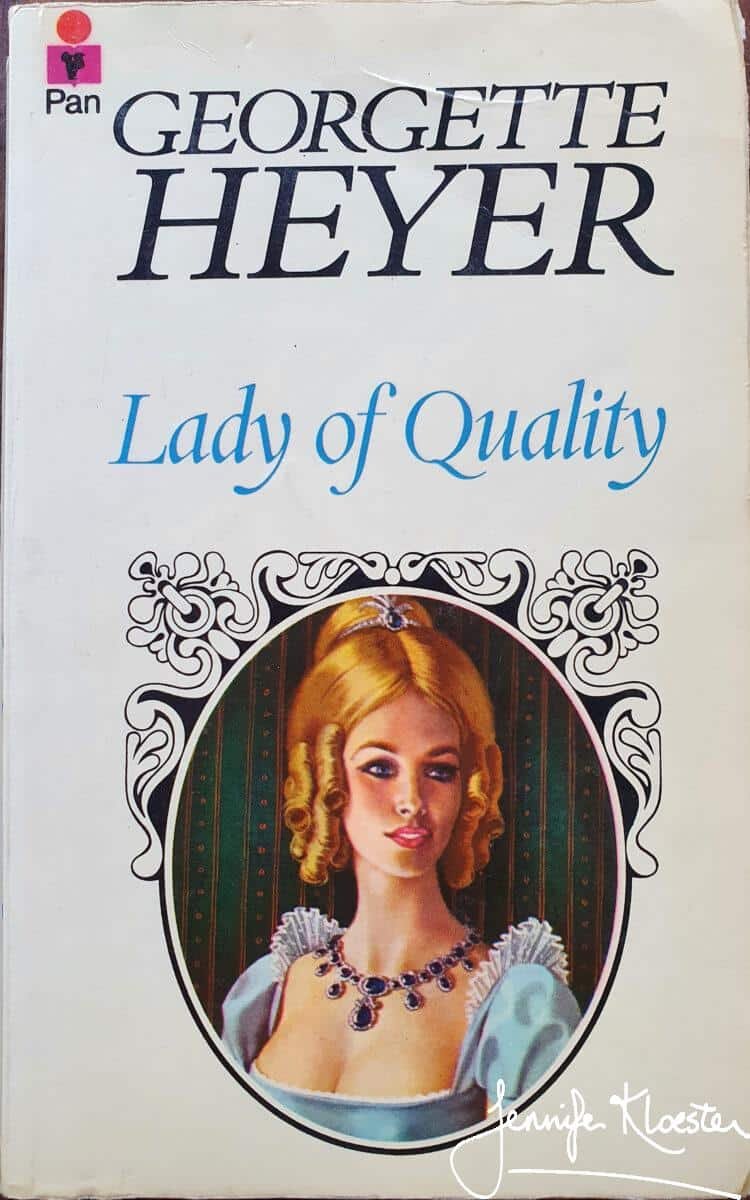
“a Light has Dawned on me”
Though it took Georgette a little longer than usual to write Lady of Quality, due to her continuing health issues, by May she had written most of the novel. She was struggling with exhaustion and it is likely that the cancer that would kill her just two years later had already begun its insidious attack on her lungs. Georgette still found enjoyment in life but she no longer took her regular trips to Fortnum’s or Harrods. Instead, she was content to spend time in Hyde Park among the trees, enjoying the flowers and the birdsong. In late May she wrote to Reinhardt with the good news that:
I think there are about 20,000 words still to be written, and it won’t take long to polish them off – now that a Light has Dawned on me. It dawned quite suddenly, this afternoon, at the eleventh hour, in fact! Until that thrice blessed moment I really didn’t know how to end the book for the only ending I could think of was so unsatisfactory that I grew more and more depressed. And then it came to me! And now that I know just what my goal is my brain and hand have become nicely lubricated, and I foresee no more difficulties ahead of me.
Georgette Heyer to Max Reinhardt, letter, 19 May 1972
She was right. The novel has a satisfying ending in which Miss Farlow is summarily dispensed with, Annis and Oliver agree to marry and – perhaps best of all – the final scene includes one of Georgette’s perceptive conversations between husband and wife. I like to think that there is something here of Georgette and Ronald in this, the very last, of Georgette Heyer’s Regency novels.

P.S. I have read what I’ve written to Ronald, & he assures me that it’s not at all dull. I fear this may be the sort of heartening thing it is a husband’s duty to say, but I must admit that I didn’t find it as dull as I’d thought!
Georgette Heyer to Max Reinhardt, letter, 19 May 1972




